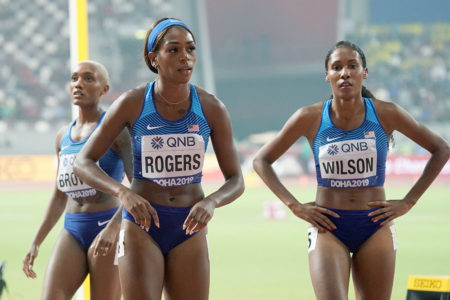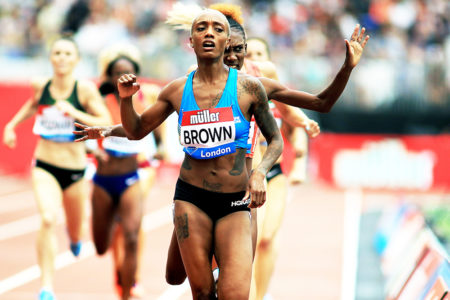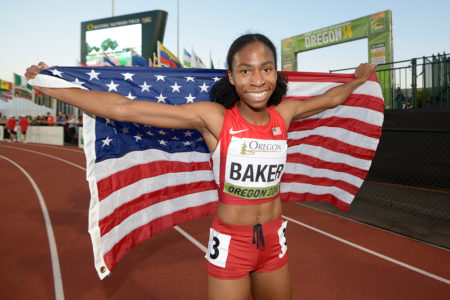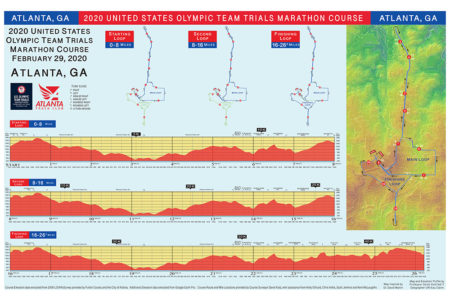HERE’S THIS MONTH’S collection of short takes on generally off-track activities that have gone a long way towards shaping the way the sport is headed.

Emma Coburn To Snub WA Steeples
One athlete not happy with the removal of the steeplechase from the Diamond League Final is ’17 world champ Emma Coburn. “I’ve been very frustrated about the steeple being cut from the Diamond League and was invited to race at a Diamond League race where there is a steeplechase in the TV window but turned it down just because I don’t agree with what is happening,” she said at Boston’s New Balance GP. “So I don’t want to compete in any races supporting the current system.”
Joe Bosshard, her husband/coach, told letsrun.com that she won’t be running in WA’s Continental Tour either, which raises the question of just how many opportunities Coburn is going to find to race her specialty in the Olympic year. So where will his wife steeple? “You tell me,” Bosshard said.
Update On The Athletics Association
Christian Taylor isn’t backing down from his idea of starting The Athletics Association to advocate for the right of athletes to have a say in the running of the sport. He’s even gotten a boost from WA, which has published his call to arms in its Spikes magazine.
“I am fully aware that World Athletics already has an Athletes’ Commission,” says the U.S. Men’s Athlete Of The Decade, “but I’m a big believer that we also needed something truly independent.” He notes that the launch of the association came sooner than expected when the Diamond League announced it was dropping 4 events. “The criteria used to drop events didn’t sit well with me and the other members agreed. They spoke about popularity of various events based off social media clicks, but that seems such a fickle, short-term methodology to use to then mess with the livelihoods of athletes.
“There is a lot of frustration among athletes, including those in events that weren’t taken out. This is the blessing and the curse of the decision to remove the 200m as a scoring event, because now that sprinters are being hit, they’re taking a bigger interest in how their sport is run.”
He reports that already more than 500 athletes have signed up. “It’s not that I want athletes standing behind me. I want them standing beside me.”
WC Prize Money: To Tax Or Not To Tax?
At most World Championships, the host country’s governments waive taxes on the prize money, so that athletes can go home with the full sums they’re promised. However, Oregon21 is not most World Championships, and the Eugene Register-Guard is reporting that the state’s lawmakers aren’t moving in that direction. Of the $7.2 million in prize money, approximately $2 million is heading to the taxman—or taxmen, plural, as the U.S. is more complicated than most hosts, with both federal and state governments wanting a share.
That taxes be waived for prizewinners is a longstanding international federation hosting requirement. Reportedly one state legislator has a bill in the works to effect the required relief. Oregon21 CEO Niels de Vos reportedly met with federal lawmakers last March but got no traction. Currently, the LOC has the estimated $2.16M liability built into its budget if it has to eat the charges.
Protest At Your Own Risk
IOC President Thomas Bach is putting the kibosh on athletes using the Olympics as a forum for political or cultural protests, saying the Games “are not, and must never be, a platform to advance political or any other potentially divisive ends.”
Last year, there were two such protests at the Pan-Am Games (one involving hammer thrower Gwen Berry). The USOPC placed Berry and the other Pan-Am protester on probation and warned that similar situations would be dealt with more harshly in Tokyo. In ’16, silver medalist Feyisa Lilesa crossed the finish of the marathon with his arms crossed in support of his ethnic group in Ethiopia, oppressed at the time. He was not punished—though he did seek asylum in the U.S. afterwards, fearful of his own country’s response.
The IOC has long had its Rule 50 in place: “No kind of demonstration or political, religious or racial propaganda is permitted in any Olympic sites, venues or other areas.” In early January, the IOC Athletes’ Commission published further guidelines on Rule 50. Examples of banned behaviors include political messaging, signs or armbands, hand gestures and kneeling, and refusing to follow ceremonies protocol. The rule applies during competition, official ceremonies, and in the Olympic Village. However, athletes will be able to express their views freely during press conferences and interviews, and also on social media.
John Carlos Critical Of IOC Stance
The most iconic Olympic protest ever, of course, was authored by John Carlos and Tommie Smith in ’68. Reacting to the IOC’s latest pronouncement, the always-outspoken Carlos told The Nation that the rule is “nonsense.” Carlos said, “They are saying that they don’t want politics at the Olympics but this is a political move. The silencing of people is political. We all love the Olympics but I’m not sacrificing my humanity to win a medal.
“The athlete should be able to make a statement on that medal stand. They are not disrespecting a flag. They are using their time to do what they think is right. They are trying to save lives. No one has the right to take away what’s inside you or silence what you want to say.”
Ironically—given that the USOC banned Carlos and Smith from the Olympic Village in Mexico City—they were recently inducted into the USOPC Hall Of Fame.
Farah In The Retesting Market?
As promised, WADA is taking a closer look at the disbanded Nike Oregon Project and has indicated it will want to reexamine samples from some of the group’s top runners.
However, Nicole Sapstead, the CEO of the UK Anti-Doping Agency, said she was not wild about turning over the samples of many-time Olympic champion Mo Farah, saying, “We supported USADA in their investigation into the Nike Oregon Project. There has never been any ill-feeling or lack of willingness or assistance on our part. But when you open a sample up, every time you freeze it and thaw it and freeze it again, you are degrading the sample. If any partner comes forward and says: ‘I have evidence to suggest this might be present in these athletes and this is part of an ongoing investigation,’ I’ll be the first one to say: ‘Help yourself. How can we help you?’ But I’m not going to risk samples that we hold in storage that could enable us to re-test when the science moves along.”
That stance generated some bad PR, and UKAD clarified its position: “To clarify, at this moment in time we have not received any request from WADA for reanalysis of samples we hold for any sportsperson.” For his part, Farah said, “I’ve said many times, I am happy for any anti-doping body to test any of my previous samples any time.”
Virus Moves World Indoor To ’21
WA has announced that the World Indoor Championships, set for Nanjing, China, in March would be postponed a year because of the host nation’s coronavirus outbreak. A day later, the World Health Organization (WHO) declared the outbreak—which had multiplied tenfold in the previous week—a global health emergency. The WA decision came on the heels of the cancelation of the Asian Indoor Championships and the Hong Kong Marathon, among other events.
The WA statement read, in part, “We have considered the possibility of relocating the event to another country and would like to thank the cities that have volunteered to host the championships. However, given concerns still exist regarding the spread of the virus outside China, we have decided not to go with this option, as it may lead to further postponement at a later date.”
No date has been set for what will now be the ’21 version of the meet, which could potentially clash with the European Indoor, set for Toruń, Poland, March 05–07. Said EA president Svein Arne Hansen, “We agreed a minimum of 2 weeks between the European Indoor Championships and the World Indoor Championships… so the athletes have the best chance to attend both.”
Looming above the crisis is the fear—perhaps fueled by the ubiquity of modern e-based communication?—that the outbreak, which has already spread beyond China’s borders, could become a pandemic and threaten the Tokyo Olympics, set for July. Also at risk might be a trio of meets currently scheduled for China in May: 2 DLs and a Continental Tour fixture.
3 NCAA Stars Go Pro Early
Mississippi State teammates Anderson Peters and Marco Arop have decided to take a pass on more collegiate seasons, turning pro after their sophomore years. Peters, who won World Champs javelin gold for Grenada, explained, “There’s no guarantee that I would break the NCAA Record, and I think it’s best that I begin competing on the professional circuit. Right now is the perfect time. There’s only one other gold medal that I can win, which is the Olympic championship.”
Arop was a 2-time runner-up in the NCAA and at 21 was the youngest athlete to make the WC 800 final. “This wasn’t an easy decision to make, but it was one I would have to make eventually,” said the Canadian import.
On the women’s side, Wadeline Jonathas, the NCAA 400 champ as a junior, opted to turn pro after a WC 4th, saying, “My coaches at South Carolina have helped me a lot. I love them. I appreciate them. I am very thankful that I ended up here at South Carolina. They are just amazing. All I know is that this is exciting, and I’m looking forward to this next step. I’m looking forward to surprising myself again.”
Diack’s Trial Postponed To June
The ongoing saga of the Diack family continues, as the trial of former IAAF president Lamine Diack, set to start in mid-January, has been delayed until June. The postponement was caused when new documents were submitted to the court relating to testimony that his son, Papa Massata Diack, gave in Senegal last November. Prosecutors asked for the delay so that they could study the new information.
The elder Diack, now 86, has been under house arrest in Paris since November of ’15. Following the hearing he asked the court to let him return to Senegal to visit family. His son is still there, with the country refusing to honor extradition requests. The 3-judge French panel—familiar with the concept of “flight risk”—opted to keep Diack in the French capital. Two weeks later he appeared in court to give more testimony.
It has also been revealed that WA is seeking more than $45 million in damages from the six defendants in the trial, “based on loss of sponsorship revenue, damage to reputation and potential loss of earnings.”
Russia Fights Back On Suspension
With Olympic participation at stake, the battle lines between WADA and Russia are becoming more clear. Craig Reedie, who just finished his term as WADA president, says the organization will stand behind its December 09 decision to throw 4 years of sanctions at Russia.
Meanwhile, RUSADA is claiming that WADA’s charges are a hoax; in late December, RUSADA sent a formal appeal to WADA that “disputes the notice of non-compliance in its entirety.” To head off the Russian appeal, WADA took its case directly to CAS in mid-January, following through on Reedie’s promise to “defend that decision with the utmost vigor.”
The IOC’s Thomas Bach is hoping that the CAS ruling will be clear and “watertight” to minimize confusion for various federations in the leadup to Tokyo. The wait could be long, however, as some reports say that CAS will not have its hearing until May, leaving the Russian situation up in the air until the Olympics are imminent.
Russian Athletes Distressed
With WA having put the “Authorized Neutral Athlete” program on hold, top Russian performers are starting to realize that their chances for international competition this Olympic year are somewhere between slim and fading fast.
Not surprisingly, anger is building, but not toward WA. Instead, the target is the Russian federation.
High jumper Mariya Lasitskene is going so far as to threaten a lawsuit against the former and current managers of the federation, saying, “In case a court refuses to accept my lawsuit against RusAF in the capacity of a public organization, I will start filing lawsuits against particular people, namely those who were officially found guilty in the case with a fake medical certificate of [Danil] Lysenko. Their actions have been detrimental and are resulting in my deprivations in moral, reputational and financial aspects. According to my preliminary estimations, it should be a multi-million lawsuit in case I completely miss this winter season.”
Lasitskene followed up with an open letter to the federation, signed by two other world champions, Sergey Shubenkov and Anzhelika Sidorova. “The Russian Sports Ministry was ordered to work out a road map to eradicate doping before December 03. But it hasn’t been done yet,” noted the letter.
The world’s No. 1 high jumper, 27, now is at risk of missing her second straight Olympics because of the sanctions on her federation. “We have problems which should have been fixed during a 4-year period,” she says. “Those who say that it’s shameful to compete under a neutral flag don’t even know how much power and energy an athlete dedicates to the sport he or she represents. We don’t how long careers will last and we retire before 40. I don’t have time to wait until the situation is resolved.”
Problems At WADA?
WADA’s investigations unit is either in bad shape or it’s not, according to recent reports. An annual audit of the Intelligence & Investigations Department of the global testing authority claims the unit is acutely short on resources and personnel. The audit was done in April and dated August. It recommended the immediate hiring of three more people, as much of the investigations work has been focused on the Russia crisis. “Taking into account the resources available…” the report read, “the quality of its work remains exceptional.”
Craig Reedie, the outgoing WADA president, said at years-end that “WADA has shown it has the will, the expertise and the legal tools to stand up effectively to this unprecedented level of cheating and corruption.” He singled out the I & I unit for playing “a decisive role” in the Russia case. It is unknown if WADA was able to direct more resources to the unit after the audit came out. ◻︎






